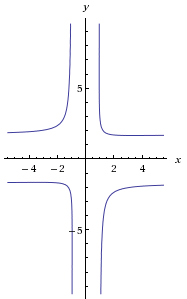A Nameless Equation, Not any more!
 Find the number of ordered pairs of integers
(
x
,
y
)
which satisfy the equation:
y
2
(
x
2
−
1
)
=
x
(
3
x
−
y
)
Find the number of ordered pairs of integers
(
x
,
y
)
which satisfy the equation:
y
2
(
x
2
−
1
)
=
x
(
3
x
−
y
)
The answer is 3.
This section requires Javascript.
You are seeing this because something didn't load right. We suggest you, (a) try
refreshing the page, (b) enabling javascript if it is disabled on your browser and,
finally, (c)
loading the
non-javascript version of this page
. We're sorry about the hassle.
5 solutions
We have: y 2 ( x 2 - 1 )= x ( 3 x − y ) (1) Firstly, we can easily see x = 0 and y = 0 satisfy. On the others hand, from (1), we have: 4 x 2 y 2 - 4 y 2 = 1 2 x 2 - 4 x y < = > x 2 ( 4 y 2 - 1 1 )= ( x − 2 y ) 2 Hence, 4 y 2 - 1 1 must be a perfect square. Let 4 y 2 - 1 1 = k 2 ( k is an integer). Solve this, we can see y = 3 and y = − 3 . If y = 3 then x = 1 ; if y = − 3 then x = − 1 . So, there are 3 solutions for (1).
Another way can be by forming quadratics, once in x, and the other time in y. Then using general formula, it'll be easier to do trial and error.
Challenge: Find a way of generating the ordered pairs of rational x , y .
Graphically, if LHS graph and RHS graph attain the value of 0 three times equally. At any other point their outcomes can't be same since degree of variables is different. Hence (0,0) is a solution. now if ;x^2- 1=0, x=1,-1 then if x=1,y=3 & x=-1,y=-3 so solutions are (0,0),(1,3),(-1,-3). it more of an obvious guess than actual solution.
Taking y = t x , y 2 ( x 2 − 1 ) = x ( 3 x − y ) = > t 2 x 2 ( x 2 − 1 ) = x 2 ( 3 − t ) Rearranging this, we get x 2 [ t 2 ( x 2 − 1 ) + ( t − 3 ) ] = 0 One solution is obviously x = 0 For the remaining solutions rearrange the previous equation as x 2 = 1 + t 2 3 − t 1 Let LHS = f ( x ) and RHS = h ( t ) Using graphical method, we find f ( x ) cuts h ( t ) 2 times. This tells us the original equation has 3 solutions. Note that, this does not, in any way, confirms that the solutions are perfect squares nor does it actually tell us the solution. The rest is trial and error, though by tracing the graph we can actually estimate the interval in which we should look for solutions.